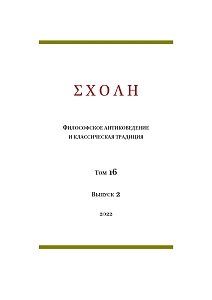Neoplatonic Exegesis of Hermaic Chain: Some reflections
Neoplatonic Exegesis of Hermaic Chain: Some reflections
Author(s): José María Zamora CalvoSubject(s): Political Philosophy, Ancient Philosphy, Philosophy of Religion
Published by: Новосибирский государственный университет
Keywords: Hermes; Julian emperor; Proclus; Damascius; Olympiodorus;
Summary/Abstract: In his exposition of the philosophical history of Neoplatonist School in Athens, Damascius attempts to prove that Isidore's soul was part of the Hermaic chain to which Proclus also belonged. According to Marinus (V. Procl. 28), Proclus had the revelation of this very fact and had learned from a dream that he possessed the soul of the Pythagorean Nicomachus of Gerasa. In the 4th and 6th centuries the expression “pattern of Hermes Logios” is transmitted through the various links of the Neoplatonic chain, Julian (Or. 7.237c), Proclus (in Parm. I.618), Damascius (V. Isid. Fr. 16) and Olympiodorus (in Gorg. 41.10.16–22; in Alc. 190.14–191.2). The formula that Aelius Aristides (Or. III.663) dedicates to the praise of Demosthenes, the best of Greek orators, arises in the context of an opposition between rhetoric and philosophy, and appears transferred and transmuted in the texts of the Neoplatonic schools to a philosophical context that defends an exegetical mode of teaching. Demosthenes, through his admirer Aristides, exerts an influence on Neoplatonism, introducing Hermes as the key piece that strengthens the chain of reason and eloquence. Hermes, the “eloquent” god or “friend of discourses”, transmits divine authority through the word of the exegete: an exceptional philosopher, a model of virtue to strive to rise to.
Journal: ΣΧΟΛΗ. Философское антиковедение и классическая традиция
- Issue Year: XVI/2022
- Issue No: 2
- Page Range: 439-461
- Page Count: 23
- Language: English

